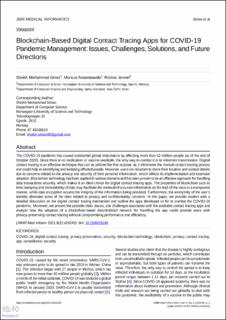Blockchain-based digital contact tracing apps for COVID-19 pandemic management: Issues, challenges, solutions, and future directions
Peer reviewed, Journal article
Published version

View/
Date
2021Metadata
Show full item recordCollections
Abstract
The COVID-19 pandemic has caused substantial global disturbance by affecting more than 42 million people (as of the end of October 2020). Since there is no medication or vaccine available, the only way to combat it is to minimize transmission. Digital contact tracing is an effective technique that can be utilized for this purpose, as it eliminates the manual contact tracing process and could help in identifying and isolating affected people. However, users are reluctant to share their location and contact details due to concerns related to the privacy and security of their personal information, which affects its implementation and extensive adoption. Blockchain technology has been applied in various domains and has been proven to be an effective approach for handling data transactions securely, which makes it an ideal choice for digital contact tracing apps. The properties of blockchain such as time stamping and immutability of data may facilitate the retrieval of accurate information on the trail of the virus in a transparent manner, while data encryption assures the integrity of the information being provided. Furthermore, the anonymity of the user’s identity alleviates some of the risks related to privacy and confidentiality concerns. In this paper, we provide readers with a detailed discussion on the digital contact tracing mechanism and outline the apps developed so far to combat the COVID-19 pandemic. Moreover, we present the possible risks, issues, and challenges associated with the available contact tracing apps and analyze how the adoption of a blockchain-based decentralized network for handling the app could provide users with privacy-preserving contact tracing without compromising performance and efficiency.
